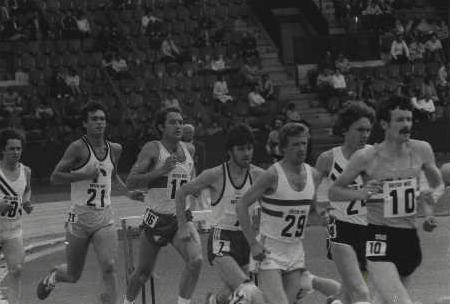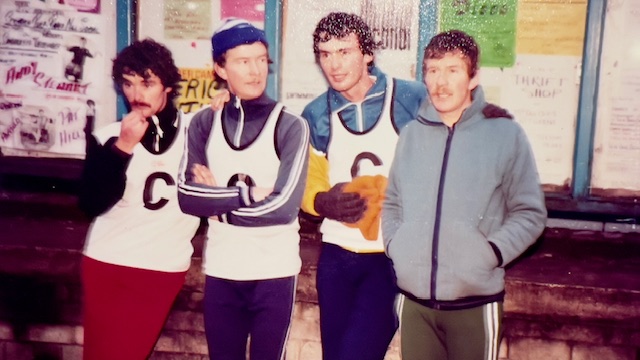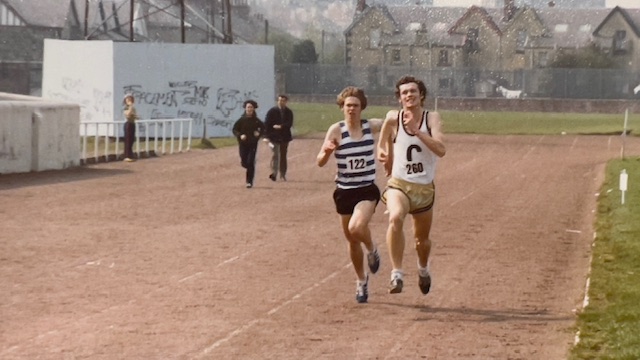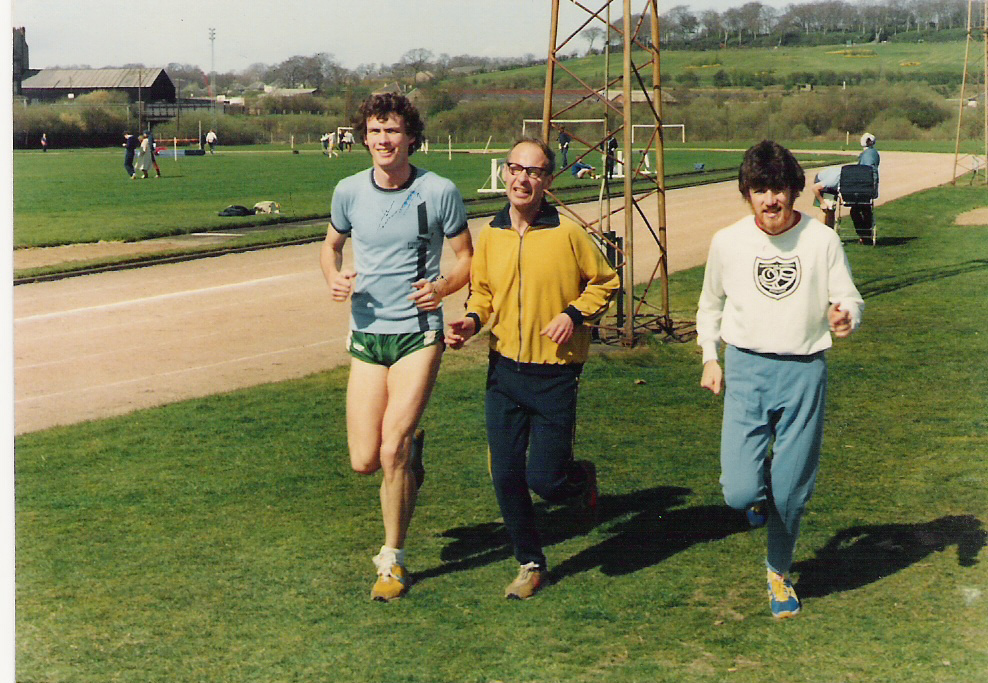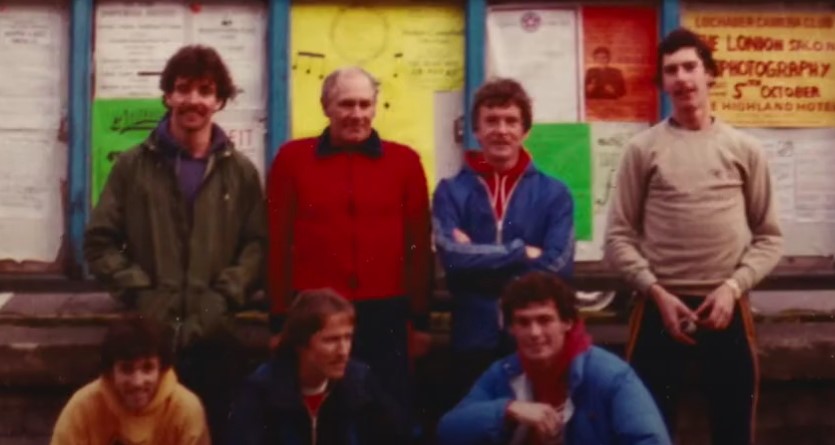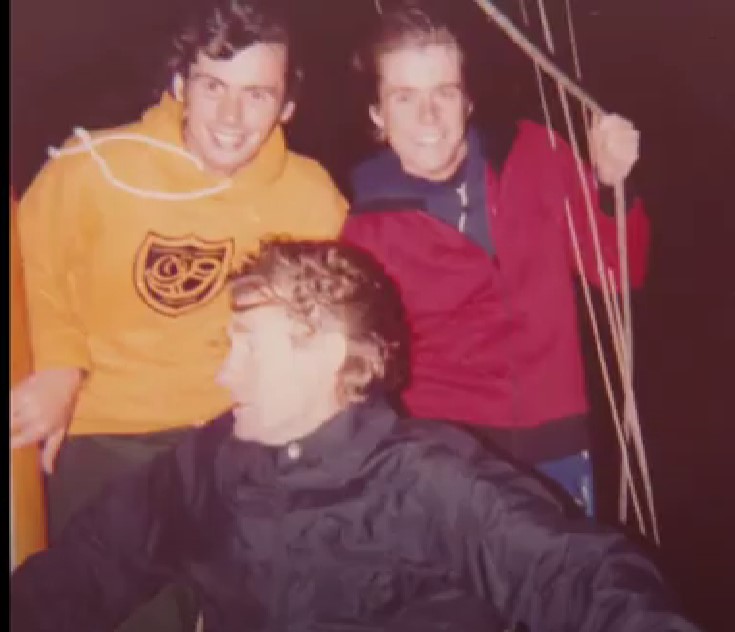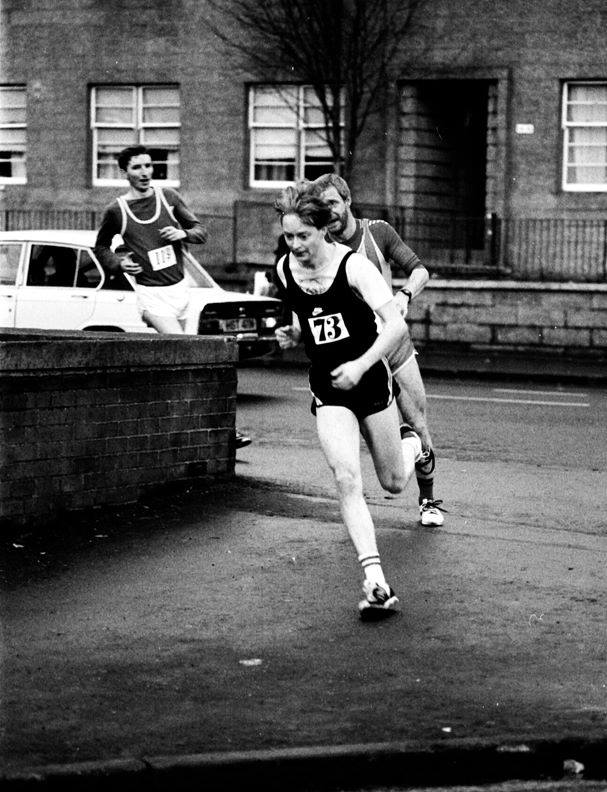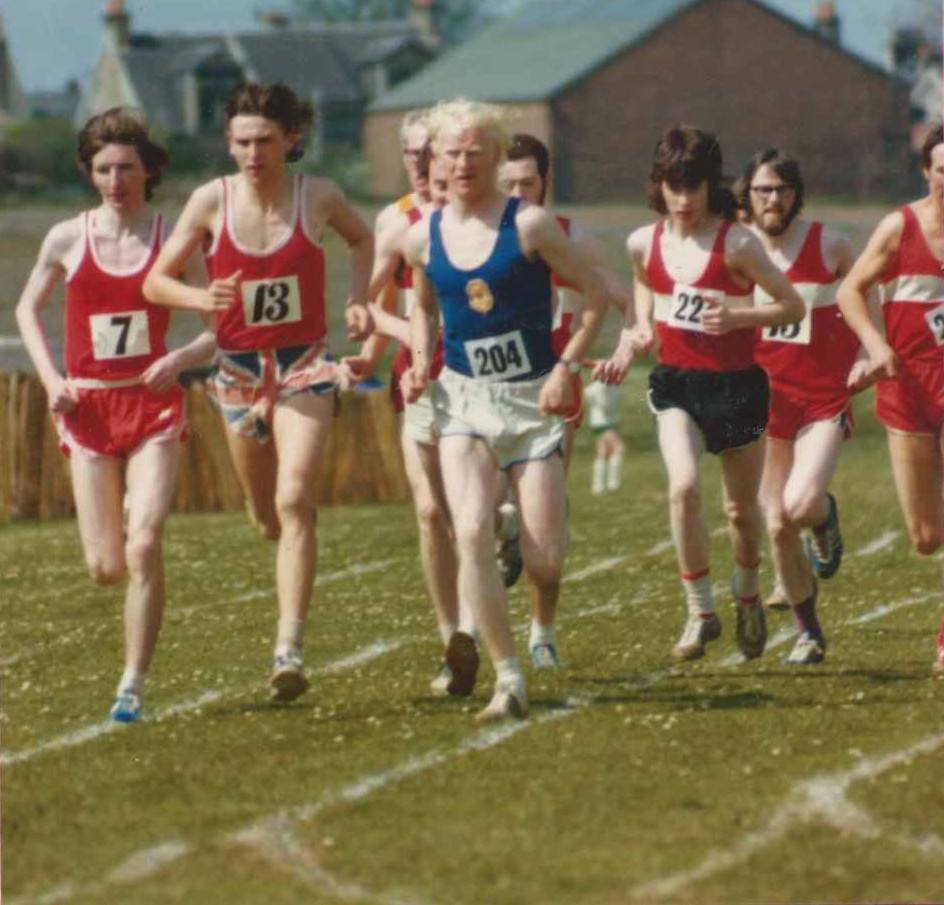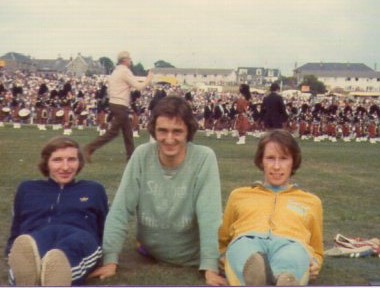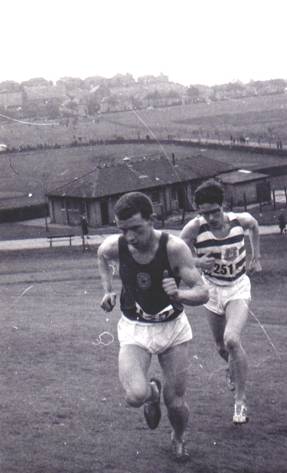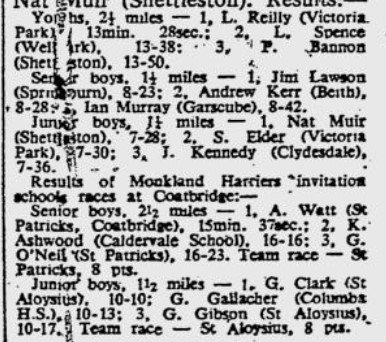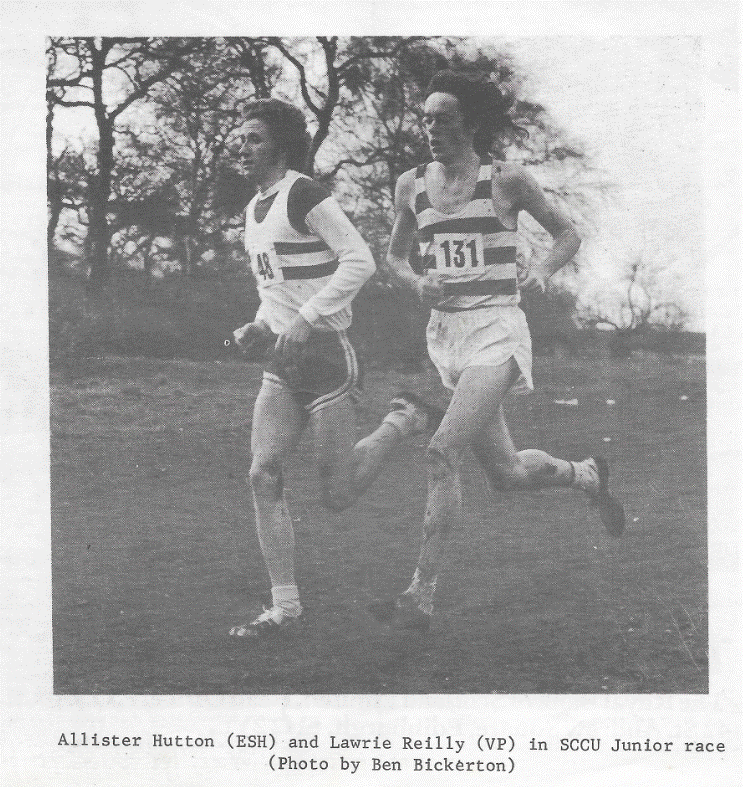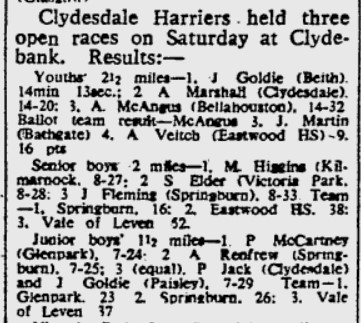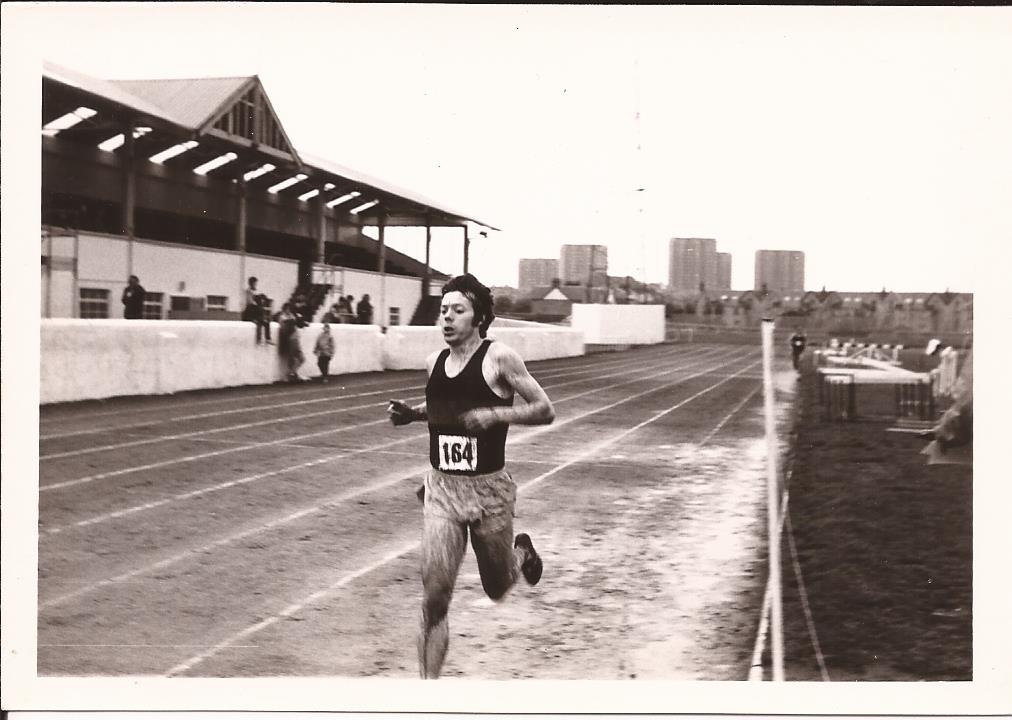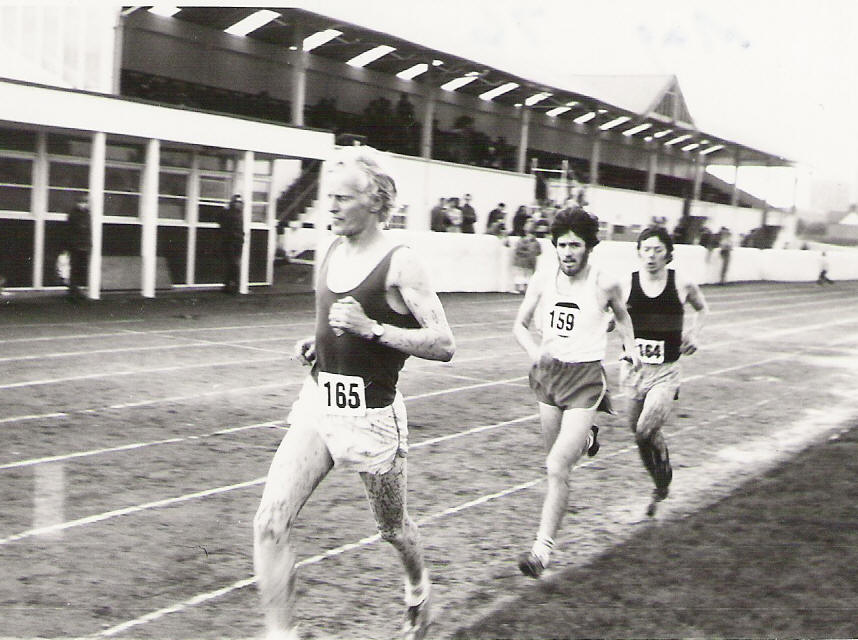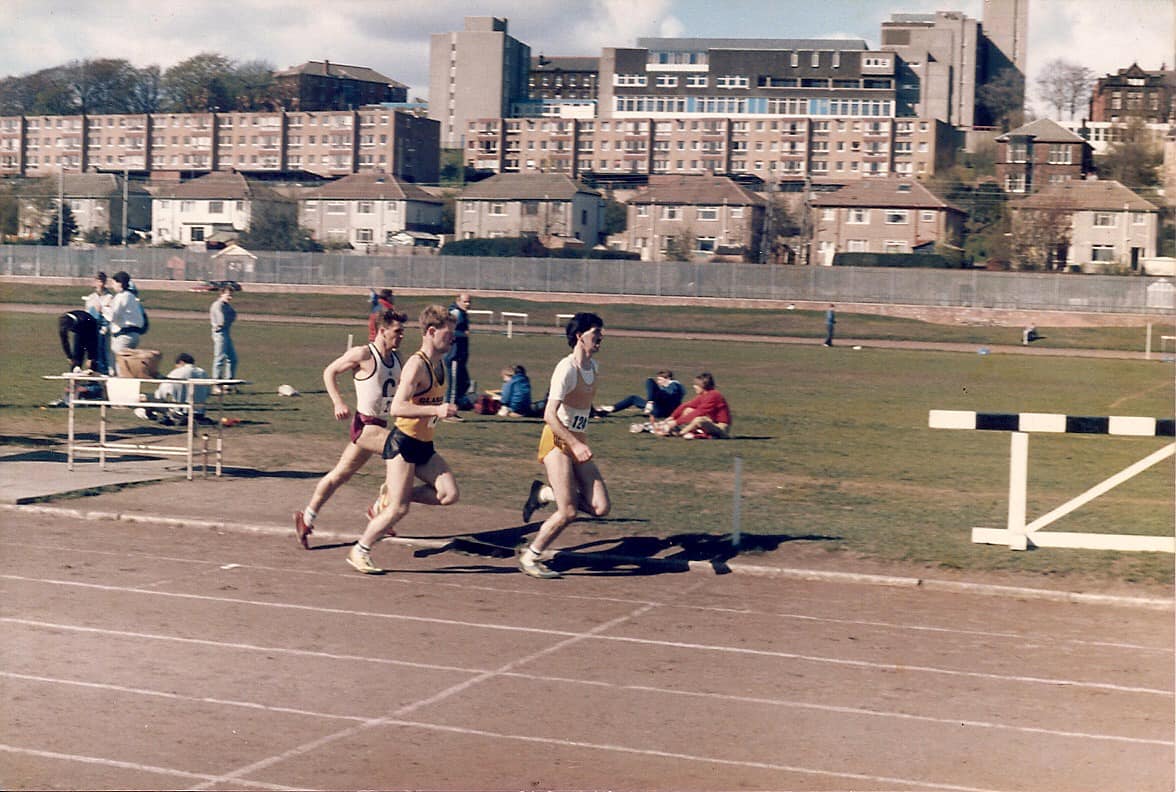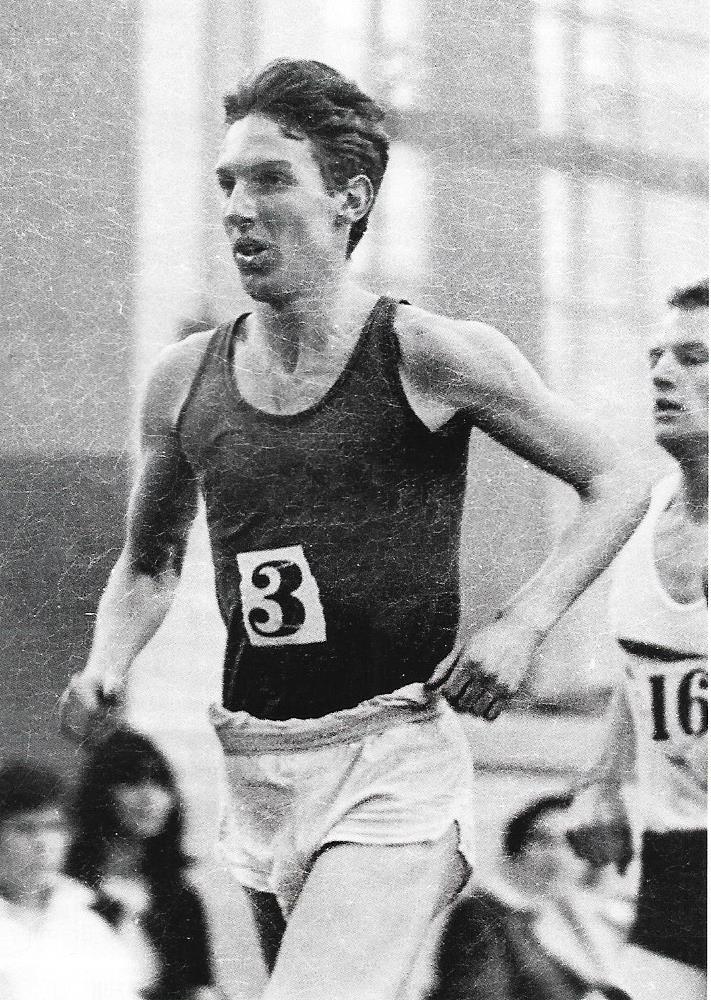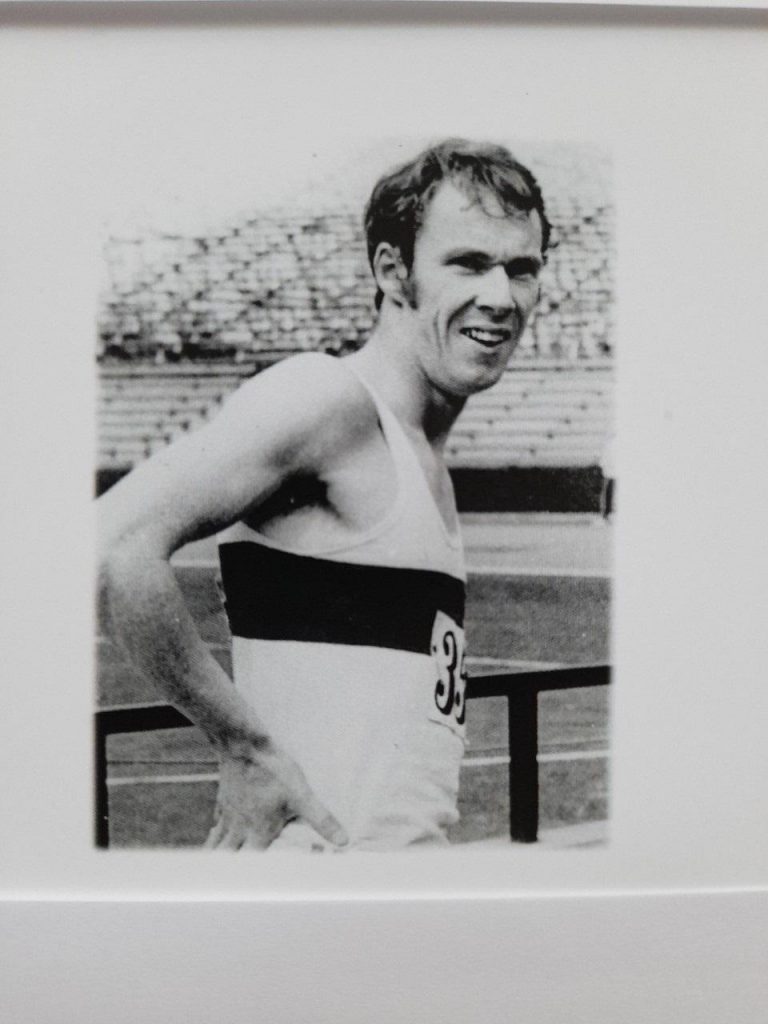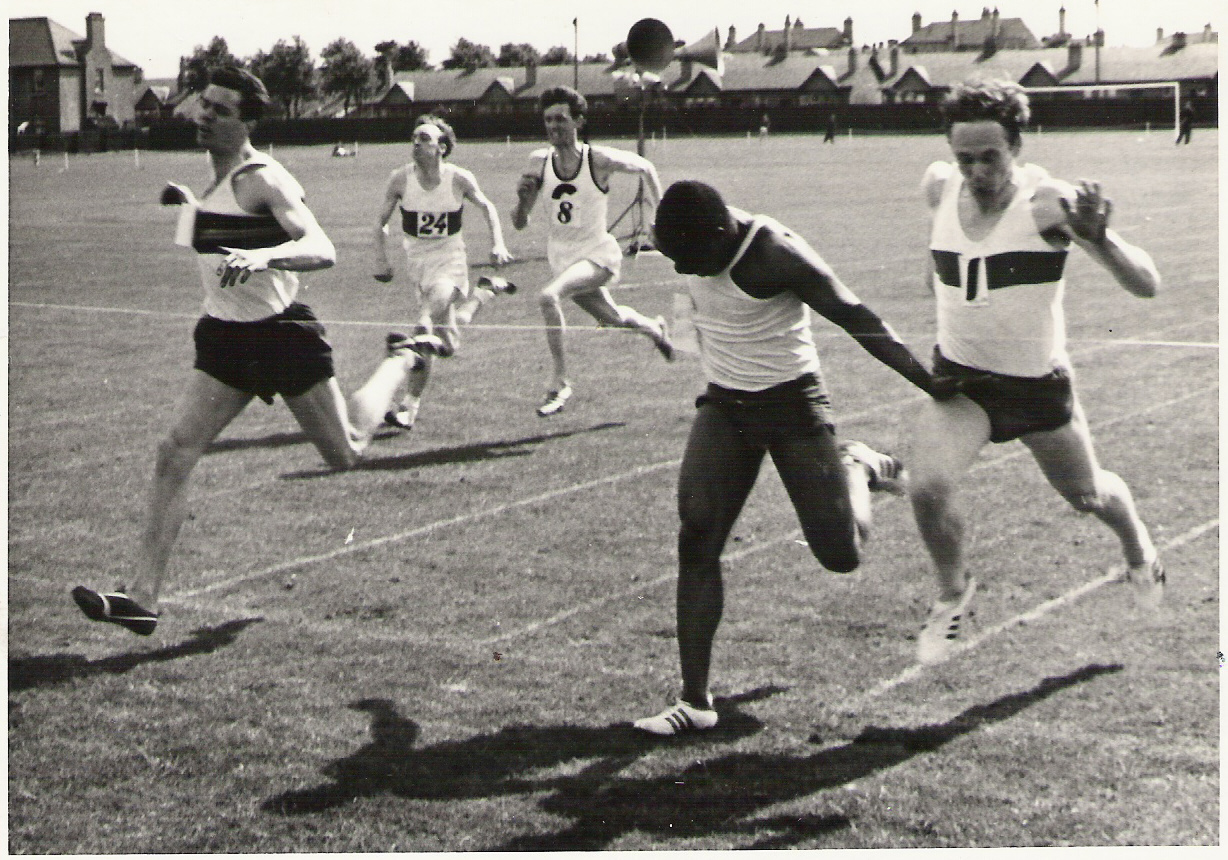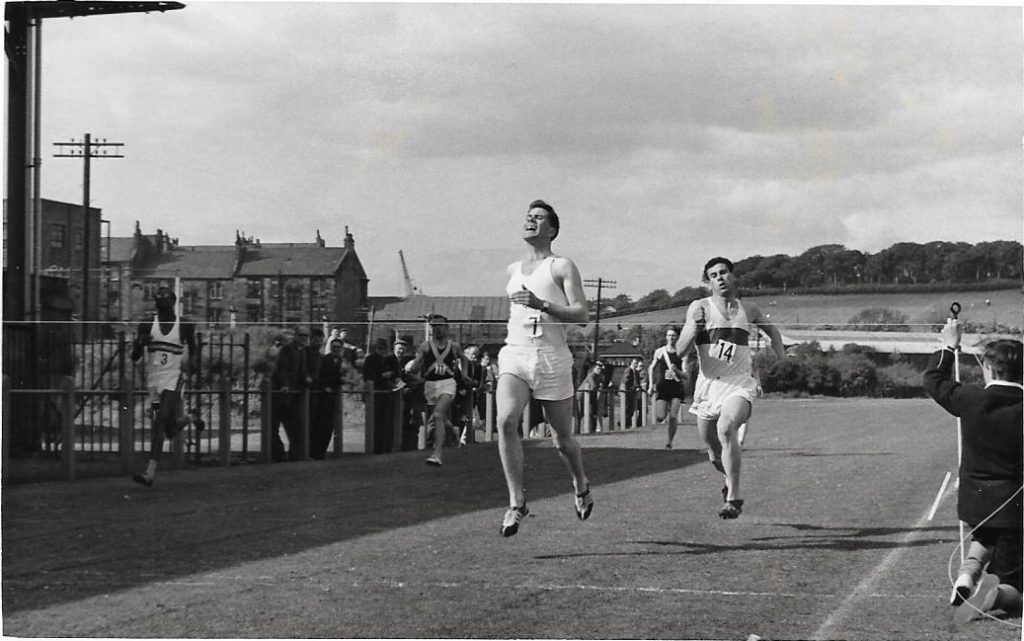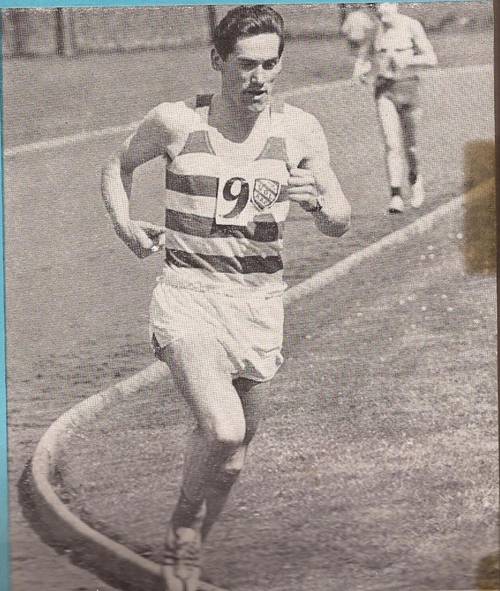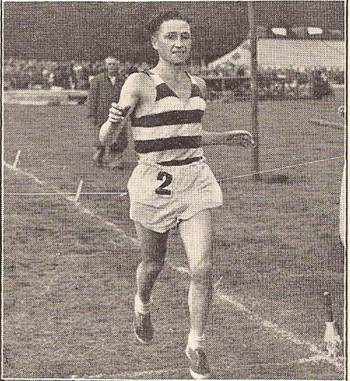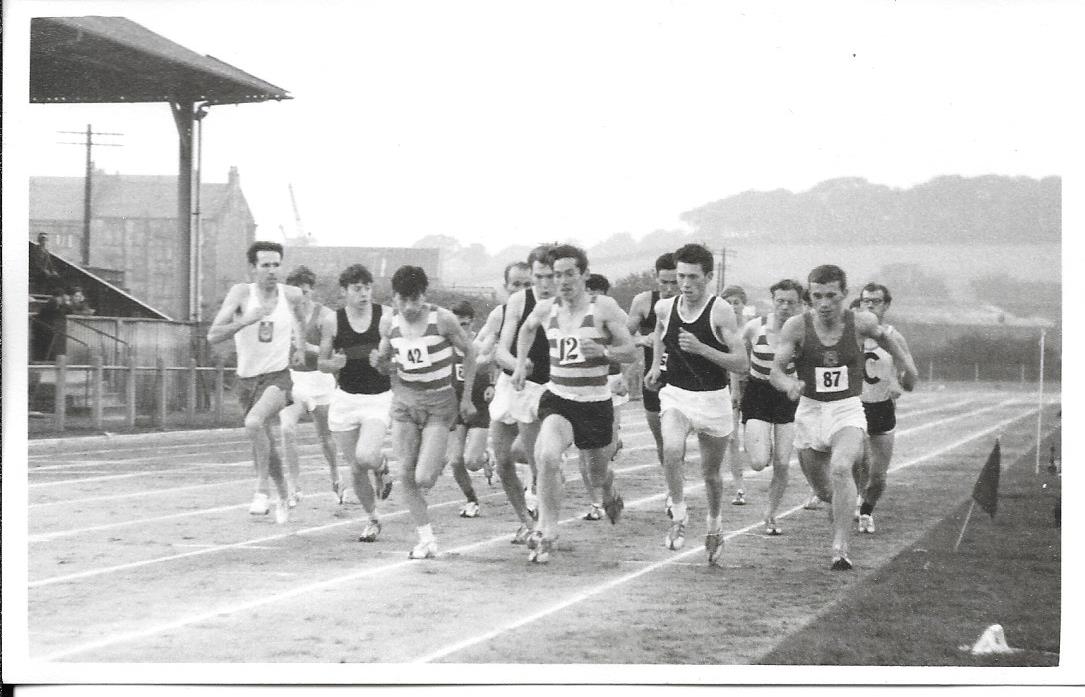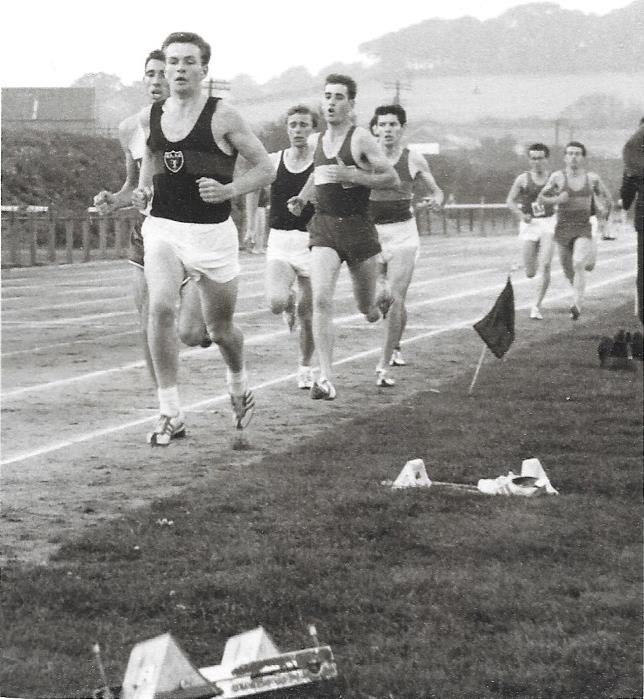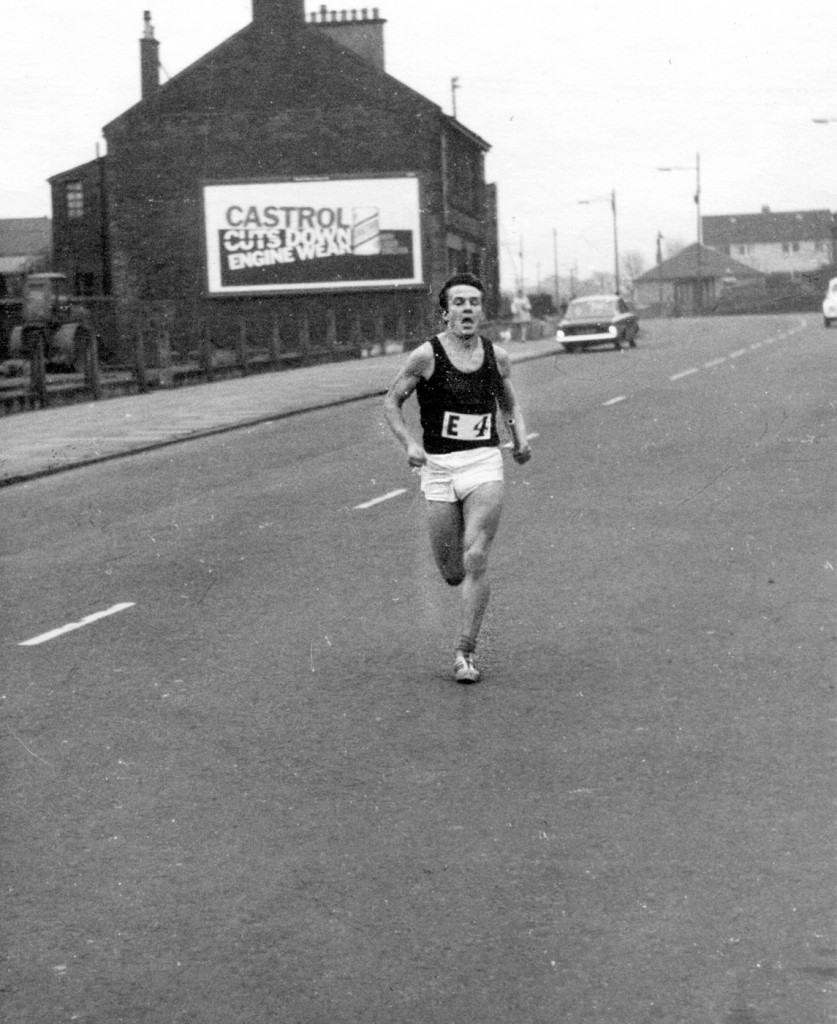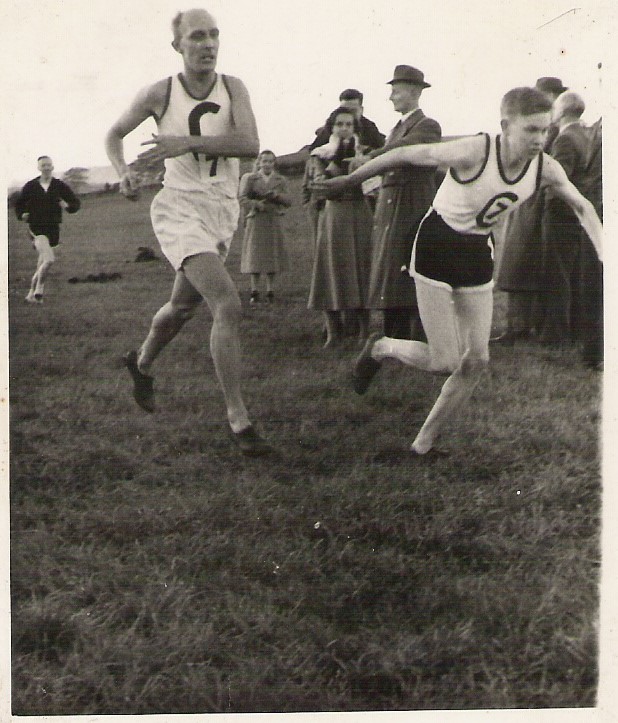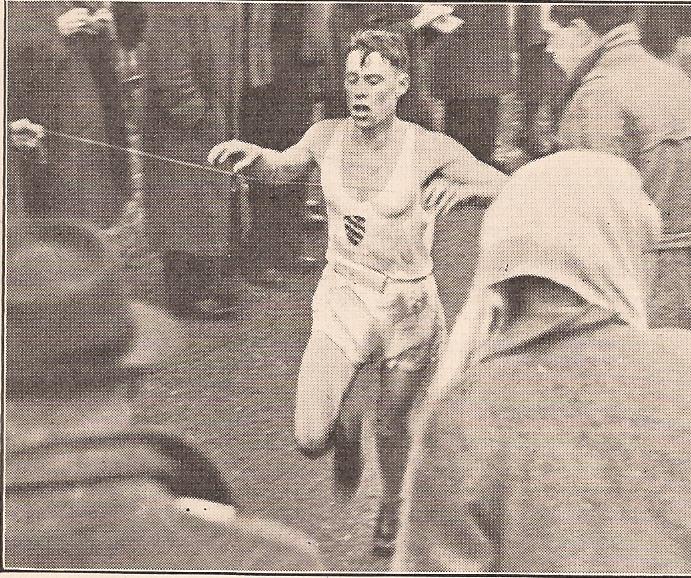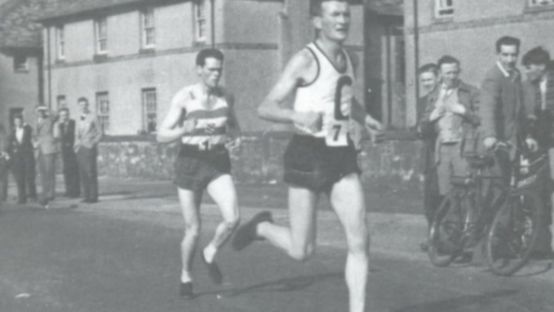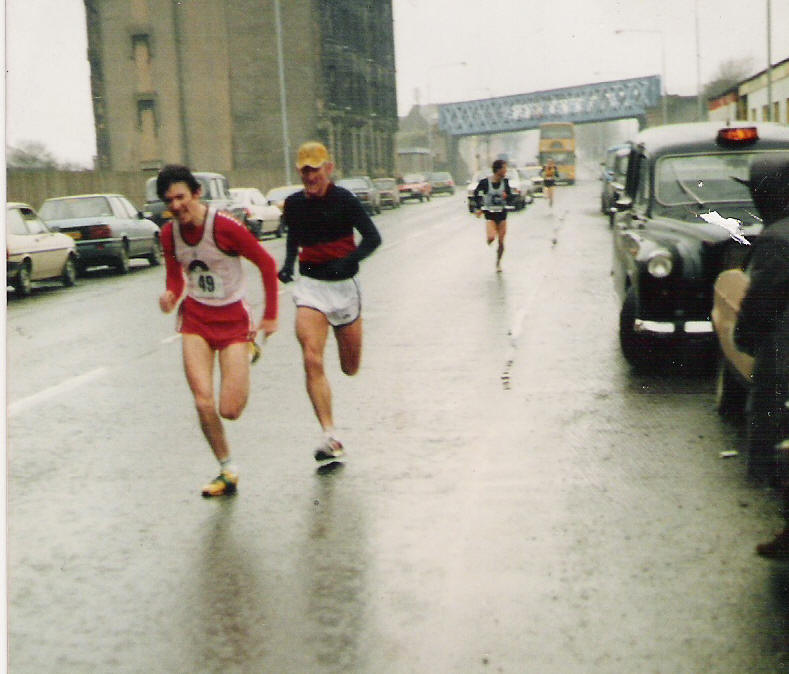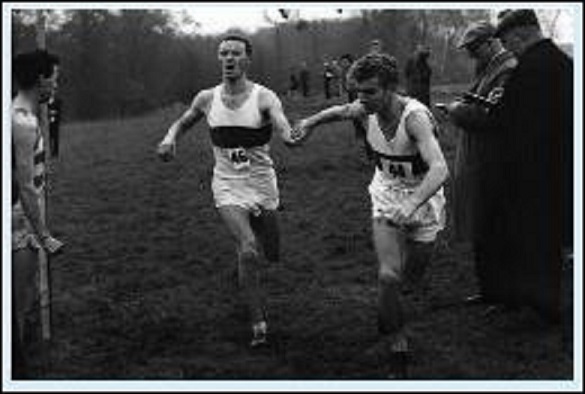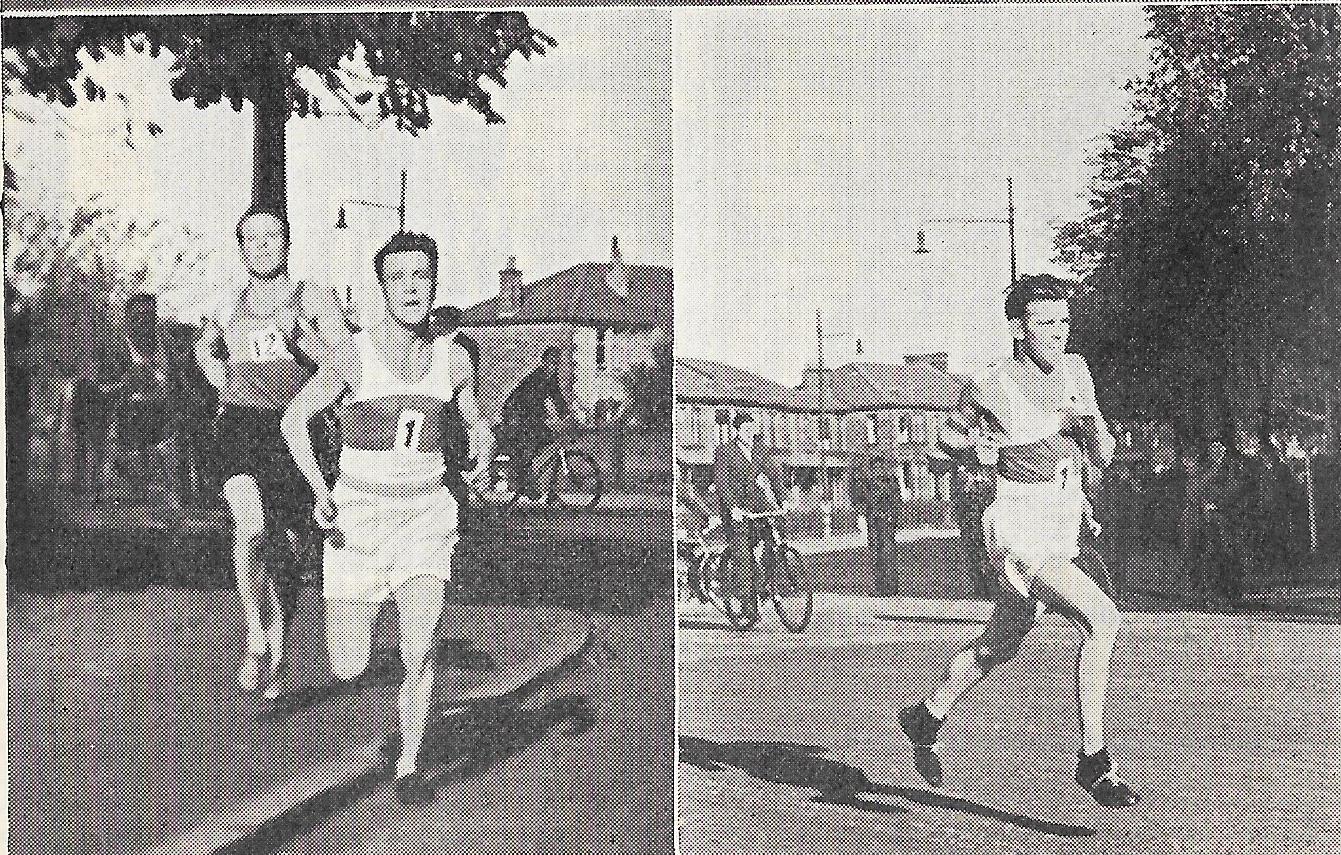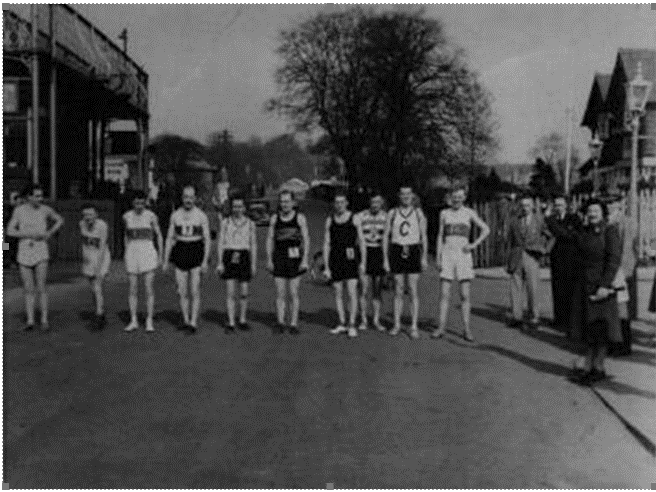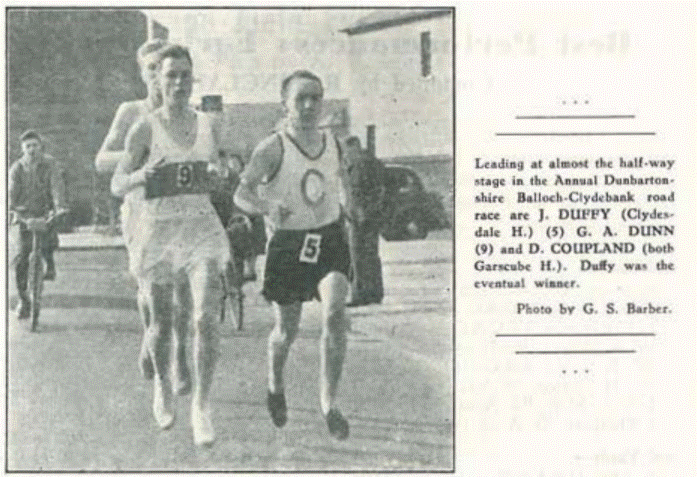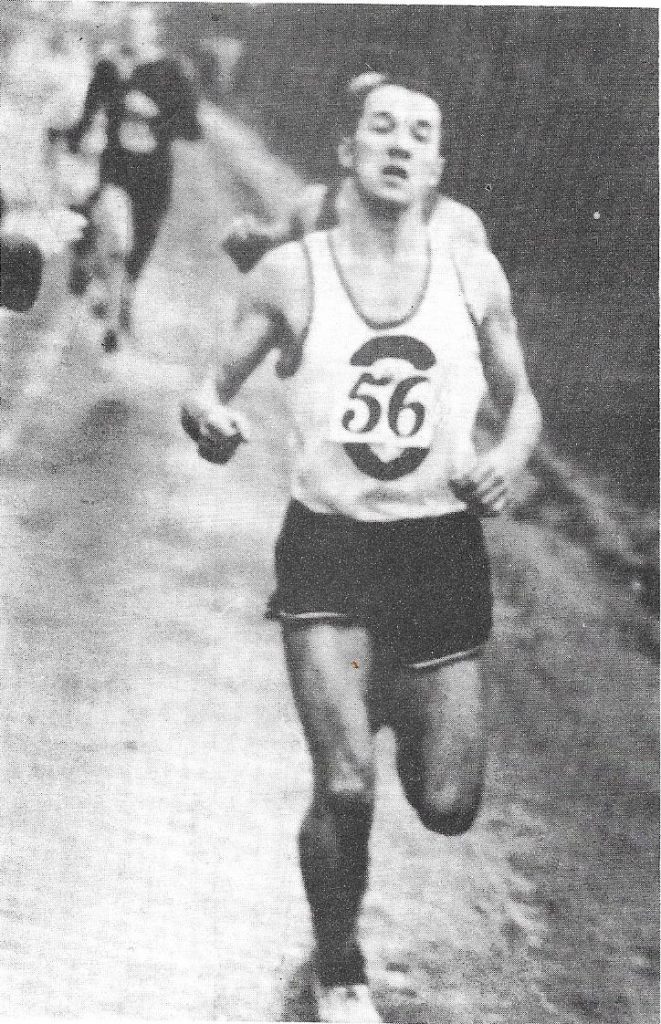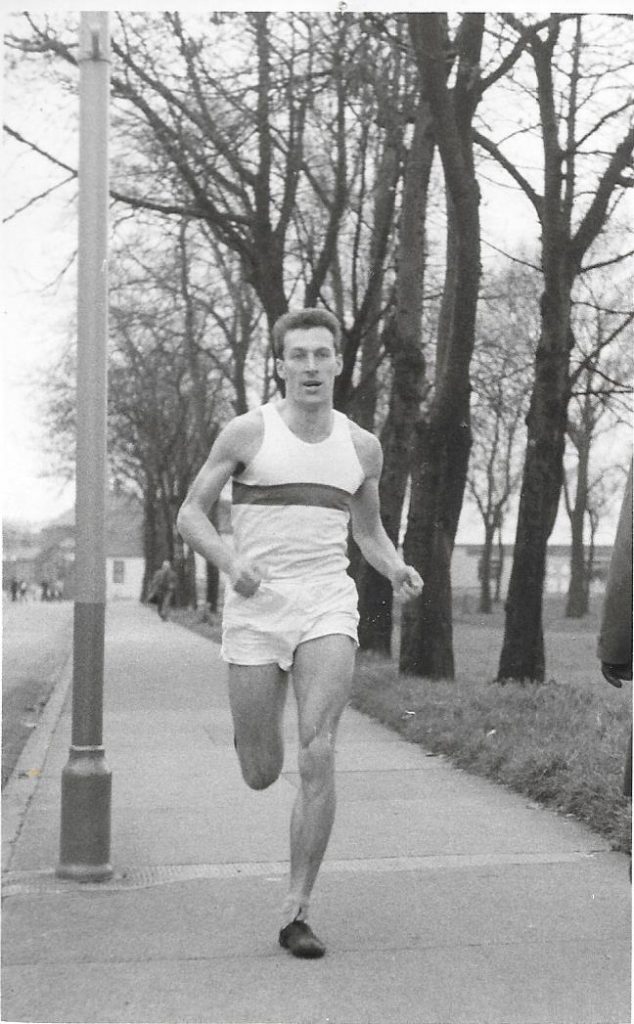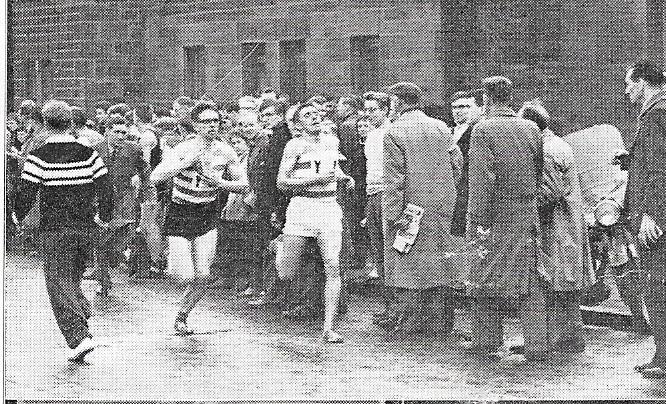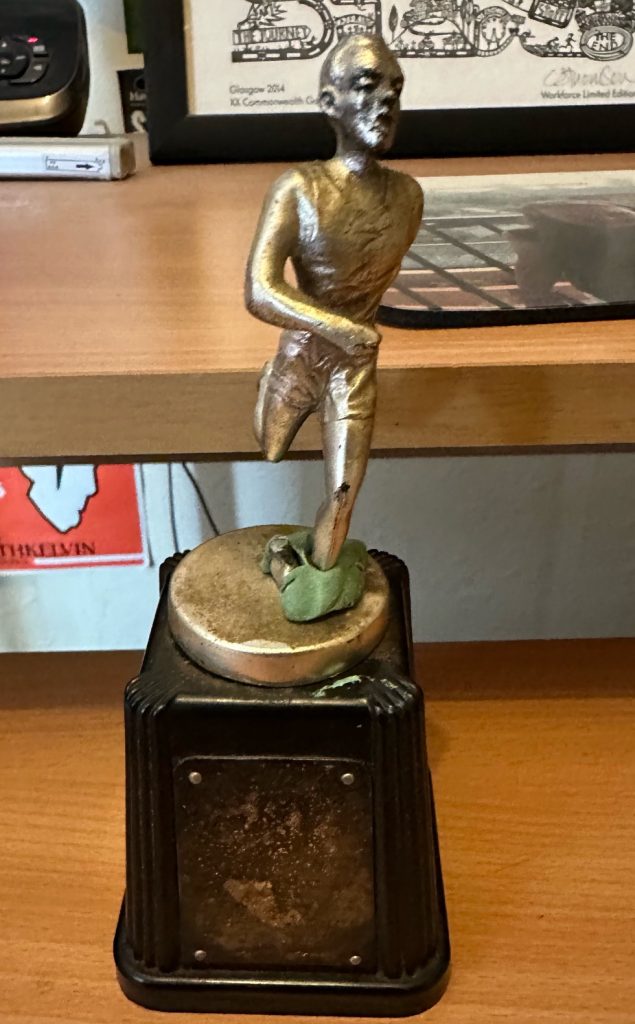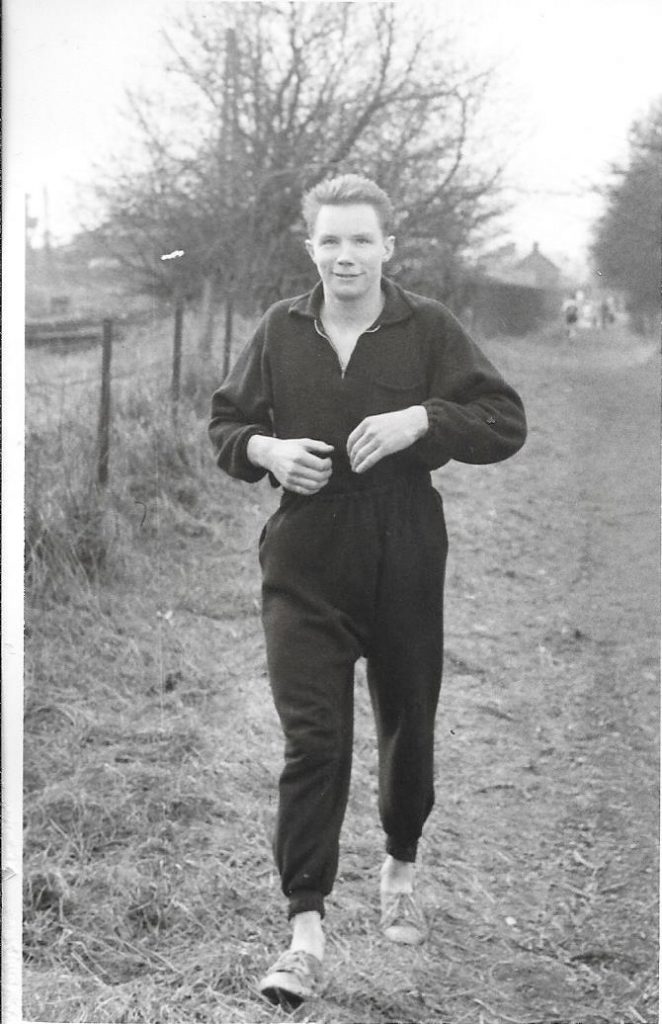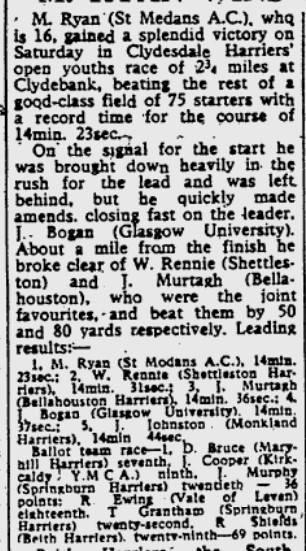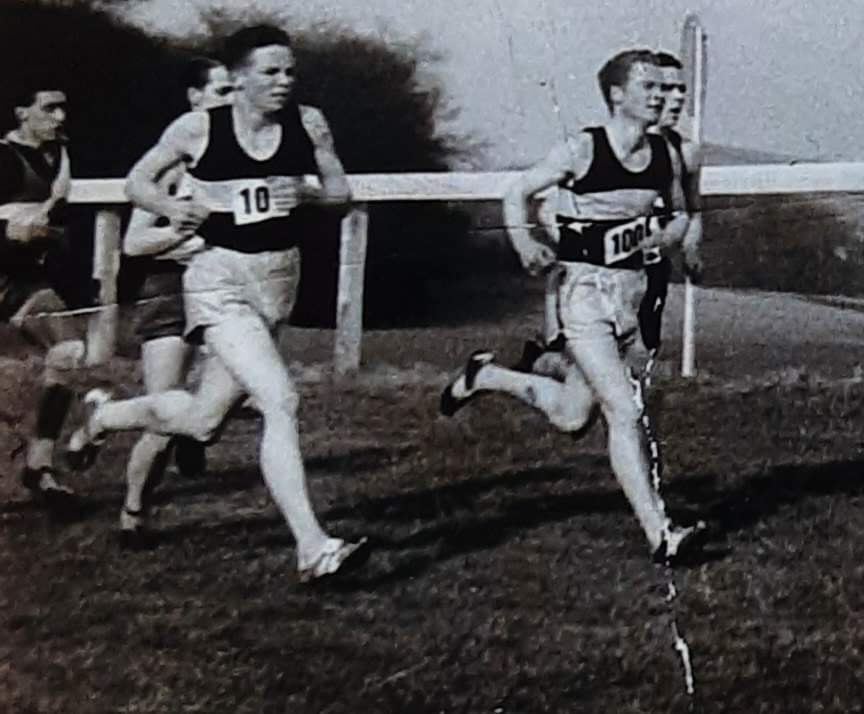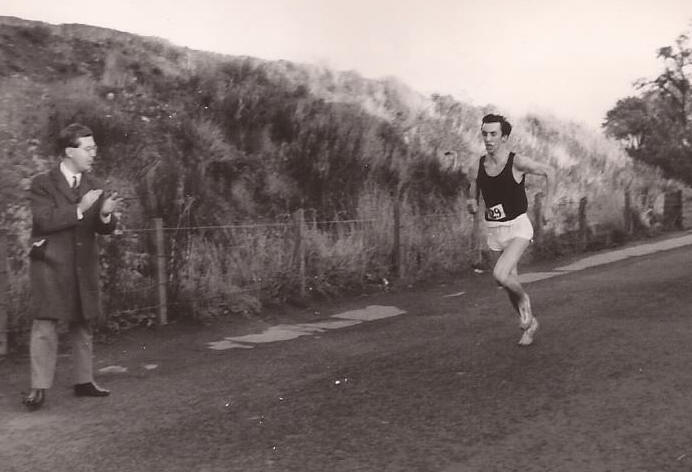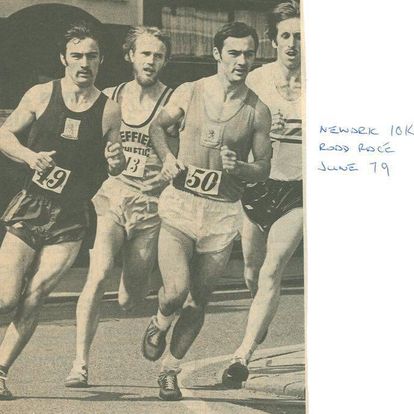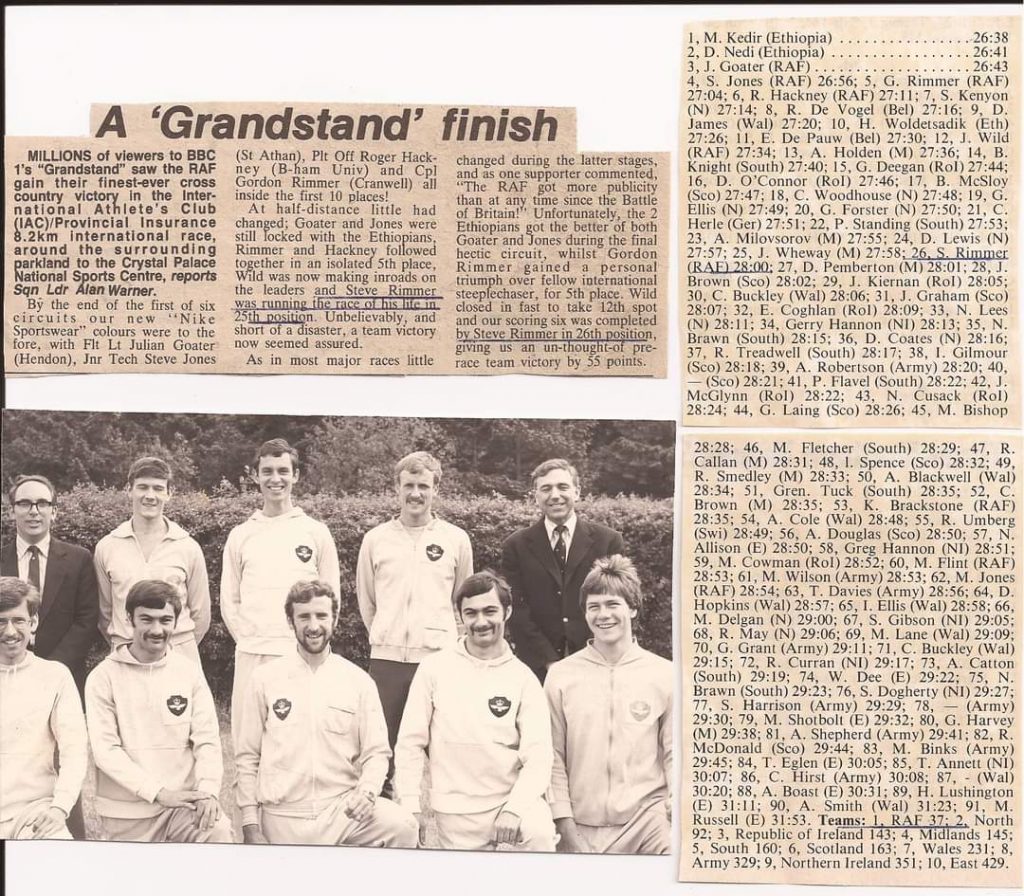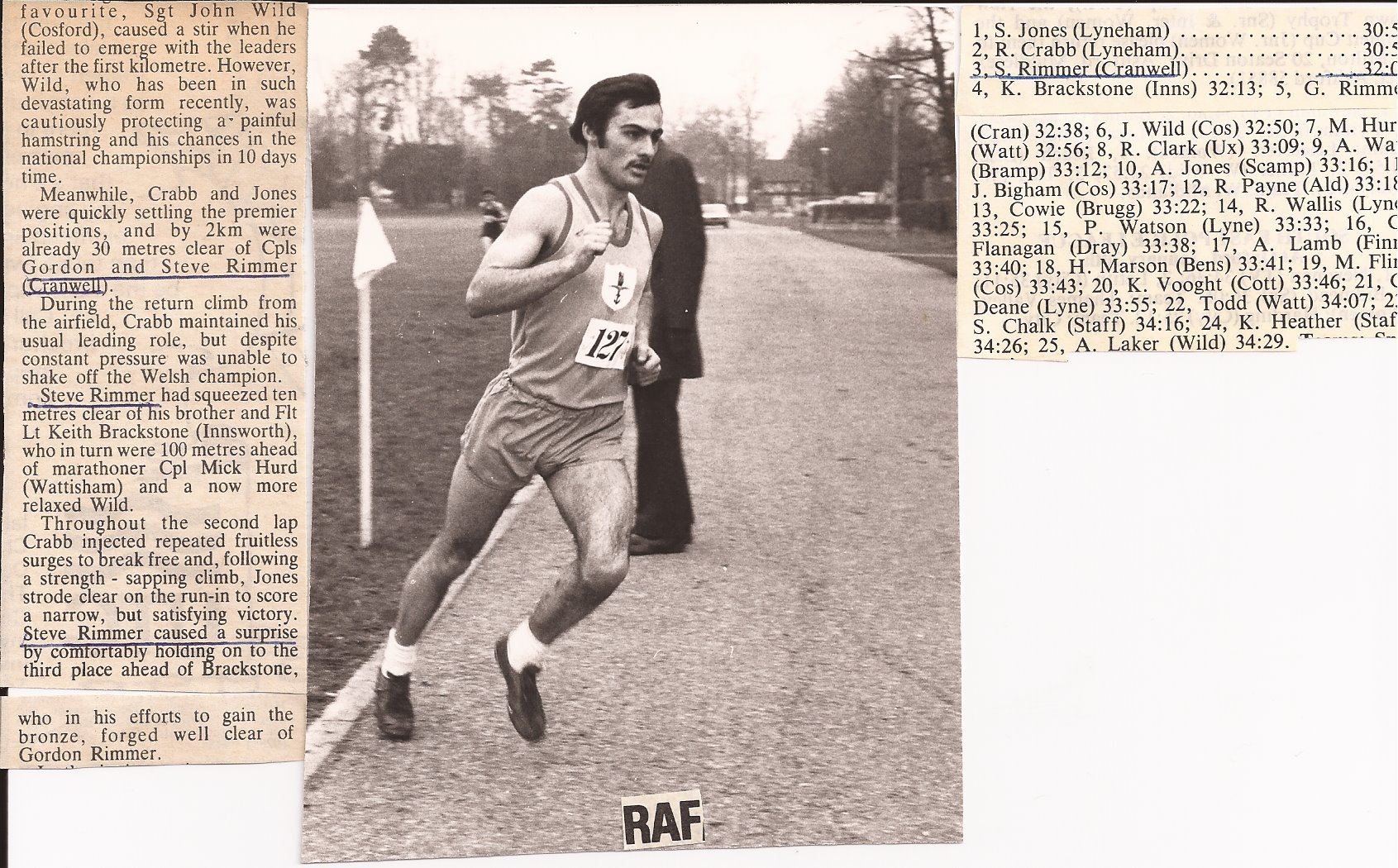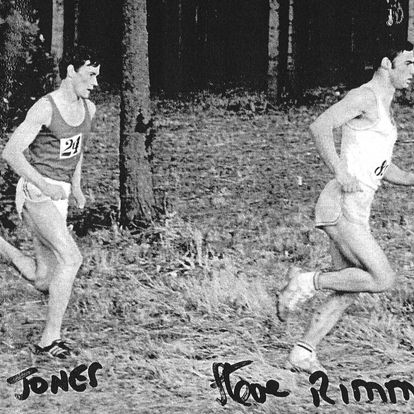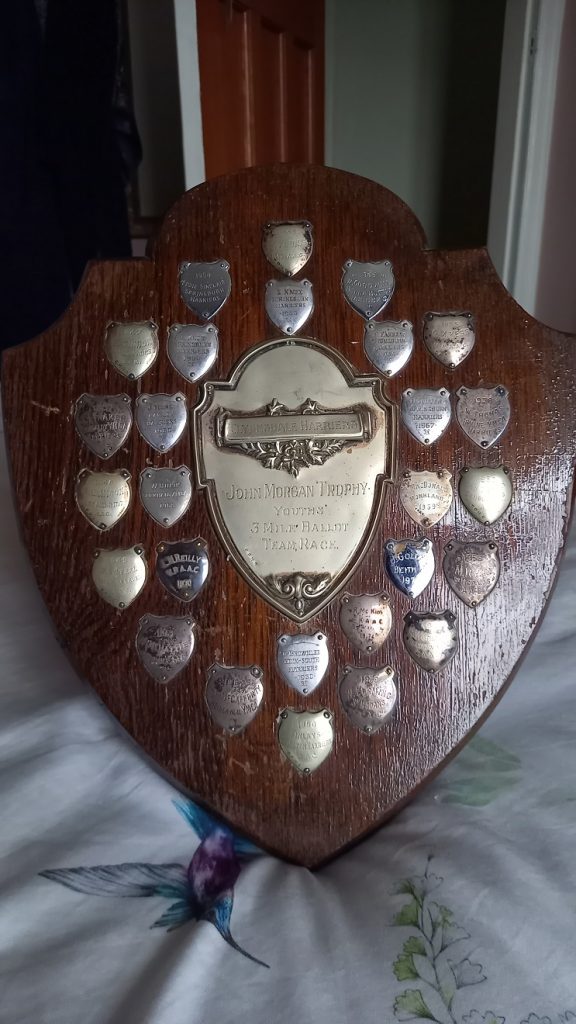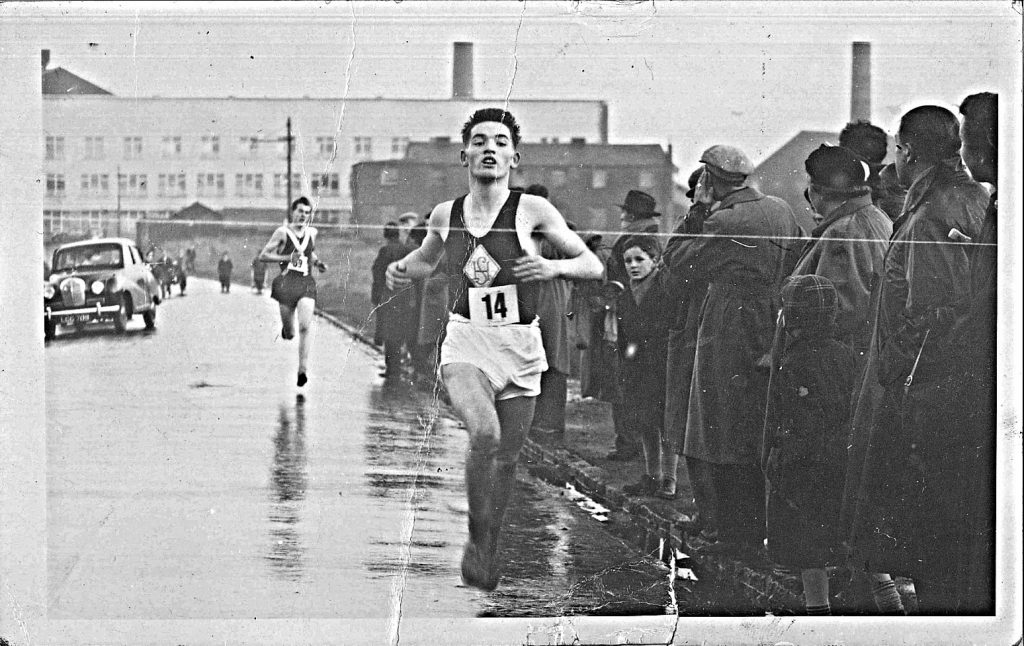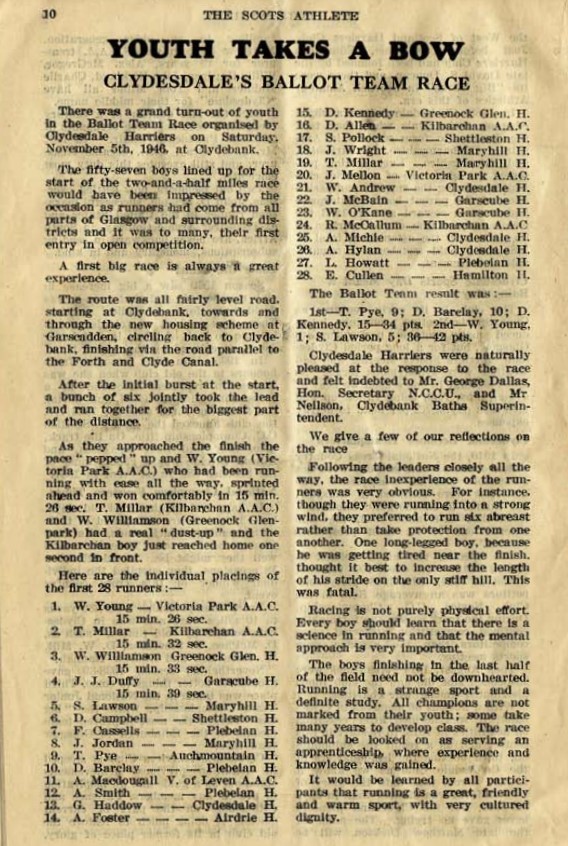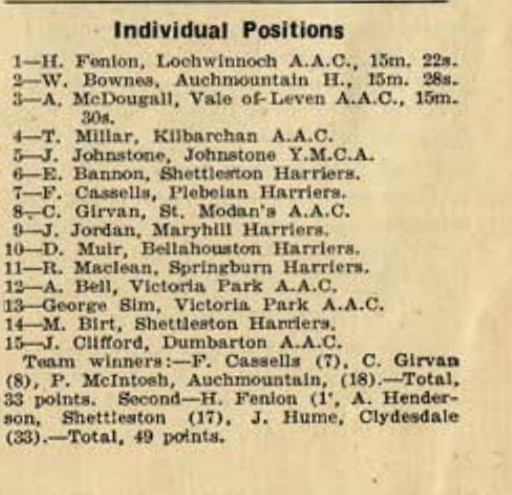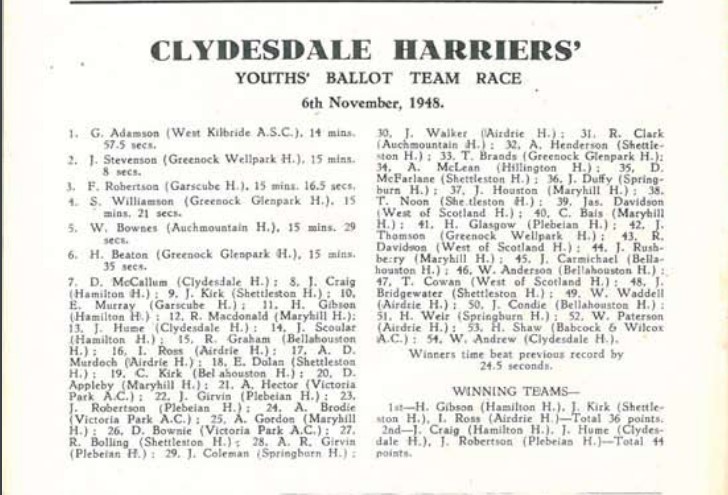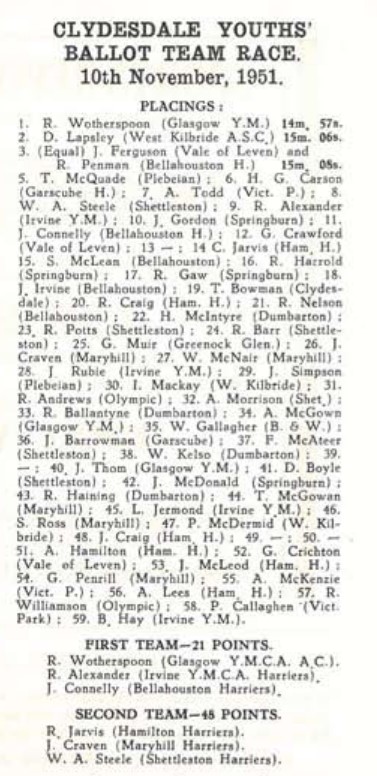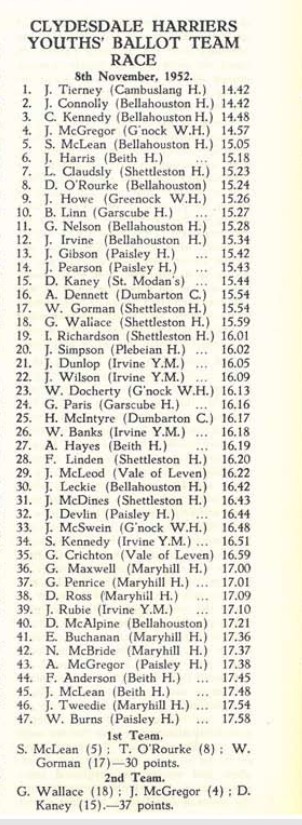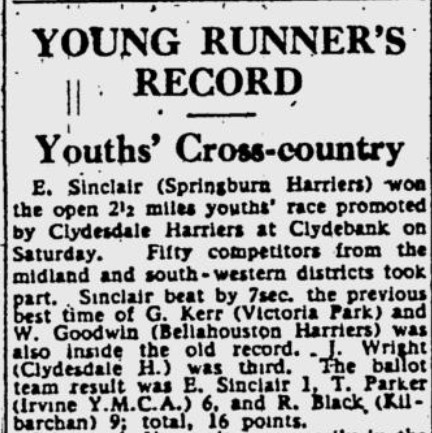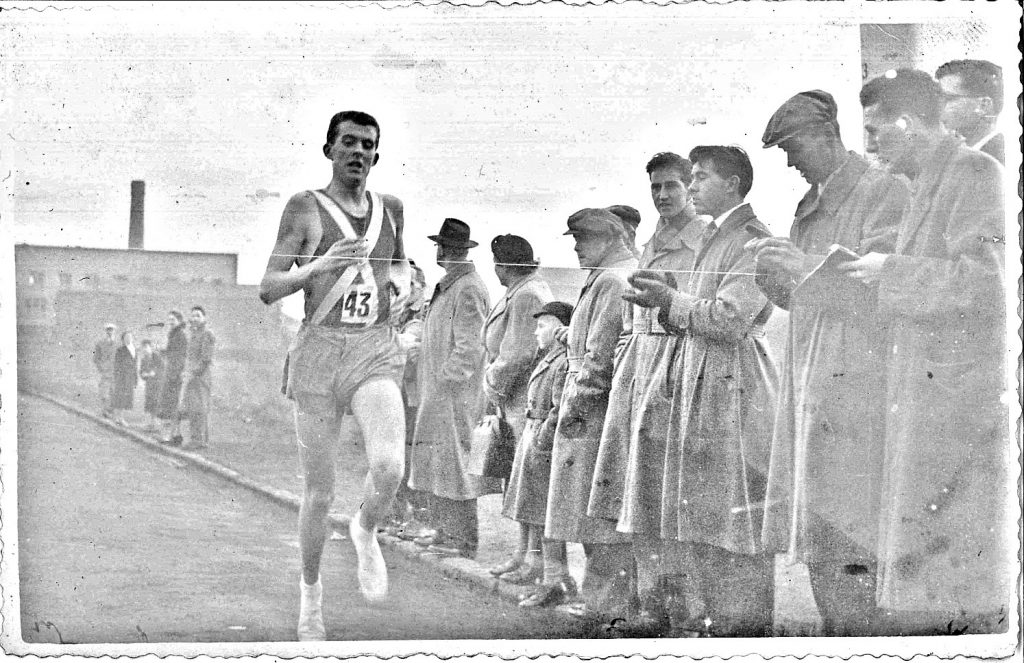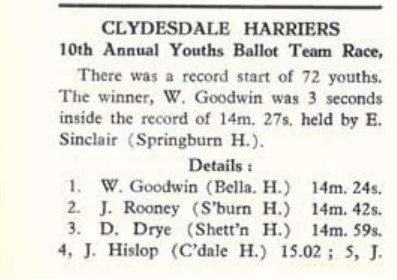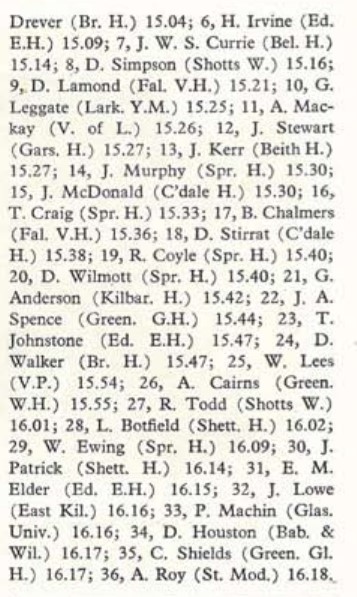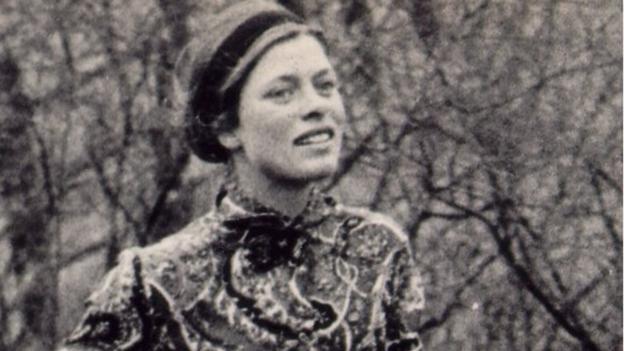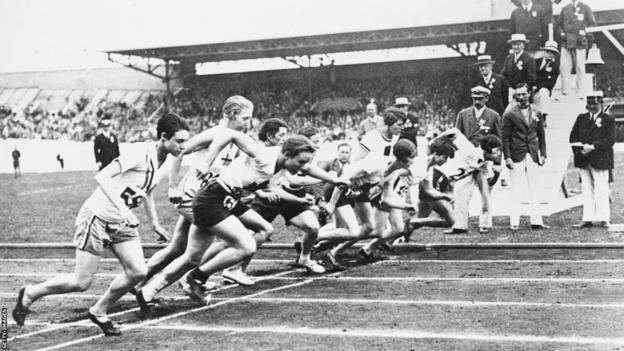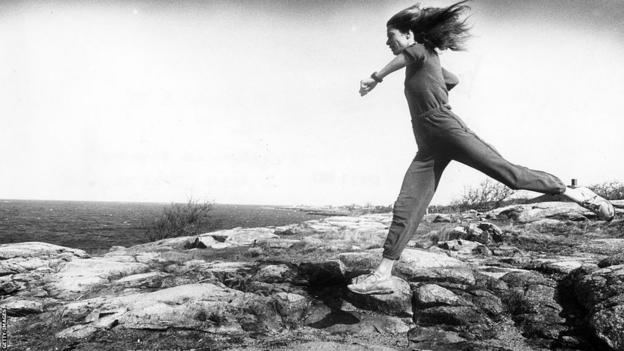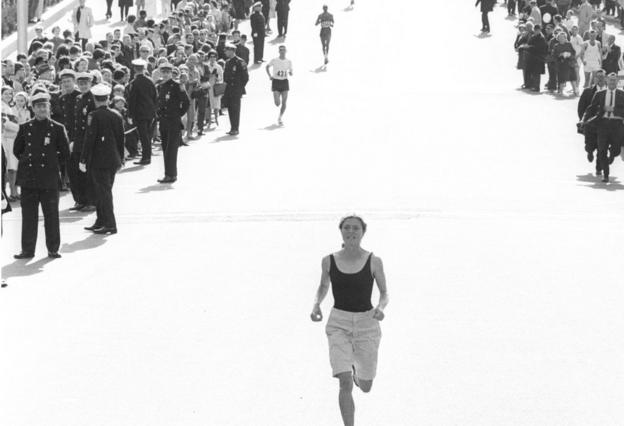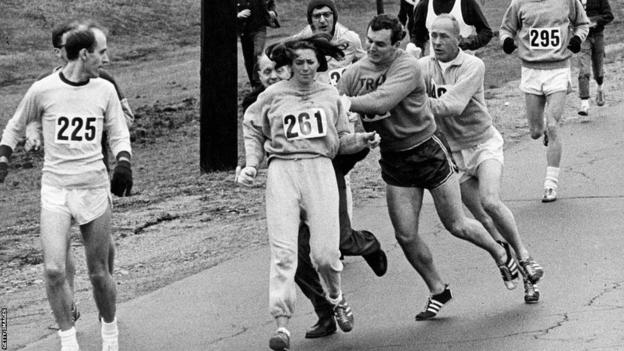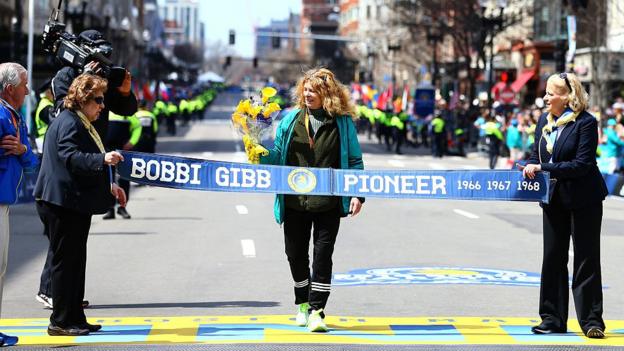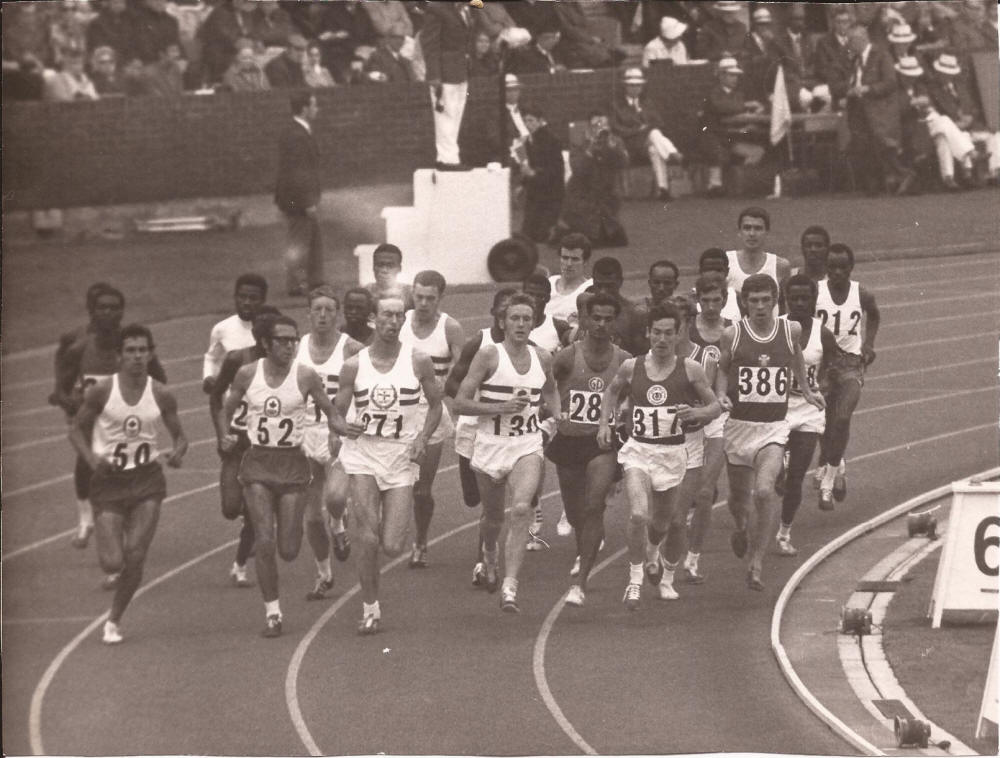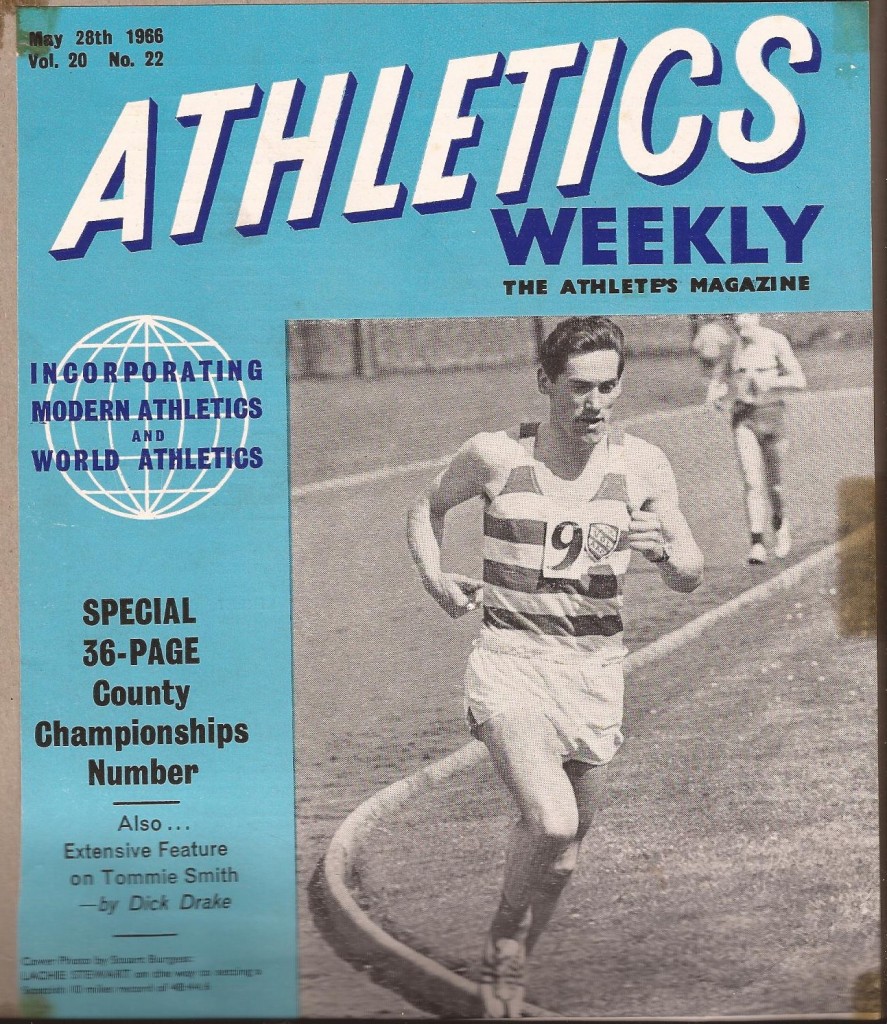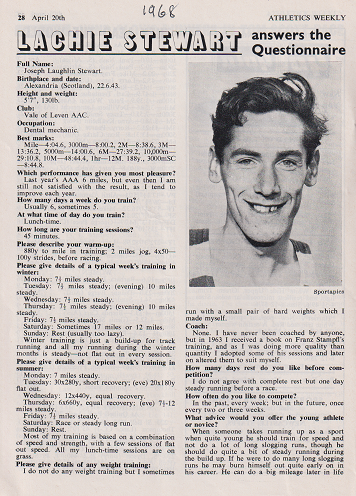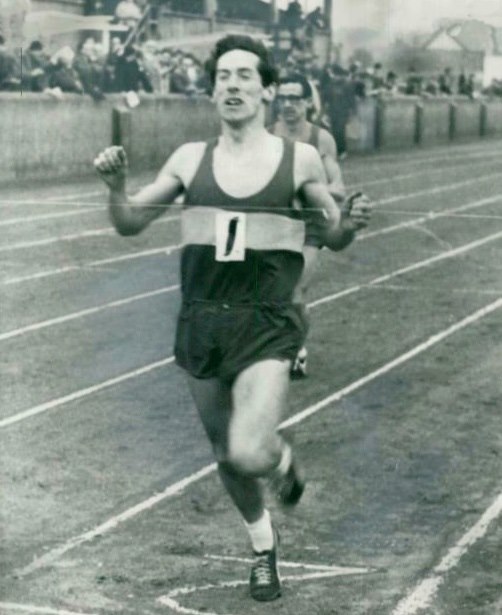Robert McWatt (21) in SAAA 5000m
Robert was a very good runner with a positive attitude to the sport which showed in his competitive record. A credit to Clydesdale Harriers and to the sport he replied to a question and answer session which is reported below.
We knew he ran for the club but did he represent any other club after emigration? The answer is that after he emigrated to Canada he joined Edmonton Road Runners and ran for them for many years. He commented “Competing in Jasper to Banff which is probably the most awesome relay in the world. Then competing in the Gold rush trail Skagway Alaska to Whitehorse Yukon relay, won my leg but our team was 2nd, I really wanted to win as they gave medals for first gold pan with small gold nugget.”
Living in the football-mad West of Scotland, the question of how he got into the sport in the first place came up. “As far as I can remember, in the early days friends and me joined a lot of clubs to try them out, BB’s etc. One was the harriers and I was a rotten young runner, but was curious about it. I love football and that was my sport – then I ran for the schools and won lots of races, then preferred this over football. I met Dougie McDonald at a schools race and then he asked me to come run in the harriers .or some team with him – I was about 16 and that was me back in thanks to Dougie Mac.”
Knowing how good a competitor he was, we asked what his best times were and when he said “ I’m not really sure I worried too much about this, and I can’t even remember to be honest.” it was not really a surprise. He reckoned that he really got other benefits from the sport – “meeting some great people, training with these people and chatting, 2 hours would go by fast. It really comes down respecting the slowest to the fastest runner, we all have a journey and story to tell, its not all about winning the race, I remember more about the people that the medals
Having joined the club and come into the wider sport he needed help to progress and credited several influences.
- Derek McGinley was a good early coach, relaxed and would listen – he had his limitations.
- Brian McAusland really focused me on how to compete
- Pat Younger showed me that there was the running for fun side in the highlands
- Dougie McDonald and Phil Dolan were great friends to be around and train with, great times.
They all combined to bring me friendship, good friends, lifestyle, health, travel, fitness.
If he wasn’t a clock watcher and personal best hunter, what were his best races? .
- Probably qualifying to run for Scotland world championships in 1978;
- In reality the two-day Glasgow to fort William solos, with Bobby Shields, George Carlin and Jim Shields – we got together in the pub after training on the Tuesday and by Saturday in a cold December we were running, torch in hand, early morning from Milngavie.
- The solo hilly marathon in Canada was a good run 2;35 on a hilly windswept course, ran from early on alone, RCMP car in front was my company for whole race.
- 2014 I decided to run an ultramarathon officially in the Rockies – 50km through rough terrain hills, rain mud and snow, but I managed to get through it.
George Carlin, Jim Shields, Robert, Bobby Shields
If they were the high spots, were there any ‘low spots’? What did he think was his worst performance?
That was going the wrong way in Western District Relay Championship. He still remembers that and the doubt when he turned at the wrong flag – It was just bad luck but it drove him on to be better – “big Pat Younger was a good sounding board that day for me.”
When he was asked what goals he had that were never achieved, he replied that
“Last time home I asked Dougie Mac what he would have done different – he said train harder and win more – I said train less and run longer in my life – I coached provincial soccer here in Canada for about 10 years – my goal was the kids to be playing all their life. and loving the sport, I remember watching another coach’s boy, John somebody, crying after losing races. Pretty sad state to get kids in.”
How long was his running career after he left Scotland? “I ran my last race here in Canada when I was 30. My first daughter, Thalia, was just bor. I ran the 10km, won it and hung up competitive racing. But always trained for fitness.”
Commenting on what he gained from sport he said quite simply a base for life “going through hard management meetings I would draw on how I could run longer than these 2 hour tough question meetings, turned into a lifeskill the running”.
Ending the interview with a return to running and training he reckoned that he was running about 80 – 100 miles per week, sometimes three times a day from Monday to Thursday.
Robert leading Alistair Douglas in the finishing straight at Scotstoun in the Dunbartonshire Championships 1500m
Having said that he was a good competitor the picture above shows him and his good friend Alistair Douglas of Victoria Park AAC battling it out up the finishing straight at the Glasgow University ground in Glasgow. The picture below shows him in an invitation 1500m race on return from a holiday in the Highlands, on the day of his return against some of the best in the west of Scotland. The field is being led by Scottish cross-country internationalist Alex Gilmour, in second place is Ron McDonald of Clyde Valley, a sub-4 minute miler and Scottish and British internationalist, tucked in is George Braidwood of Bellahouston, another international track and cross country runner, 96 is Billy Nelson, a good club runner, inside him is Hugh Forgie of Law, another track internationalist, behind him are Jim Golder of Ayr and Stewart Easton of Falkirk, both internationalists, ? , and Robert at the back. He battled through this field of quality runners to finish third. A remarkable run. 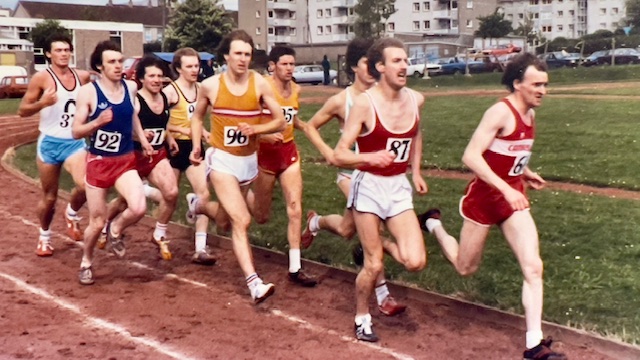
It was a time when the standard nationally was high but he more than held his own as the following results from District and National Championships shows.
| Year | Age Group | District | National | Year | District | National |
| 1975/76 | Youth | – | 8th | 1979/80 | 29th | – |
| 1976/77 | Junior | 28th | 28th | 1980/81 | 30th | 72nd |
| 1977/78 | Junior | – | 6th ** | 1981/82 | 37th | – |
| 1978/79 | Junior | 21st | 6th | 1982/83 | 31st | – |
** International selection. The Scottish age groups did not coincide with the International ones; two of the runners ahead of Robert were too old to qualify; the following year, although placed 6th again he himself was too old for selection.
Robert also ran in the prestigious eight stage Edinburgh to Glasgow Relay six times with his best run being in 1982 when he was seventh on the first stage. The picture below shows him leading with Tommy Wiseman of Victoria Park with Olympian Don Macgregor just behind.
Individually he ran in open races, championships, open graded meetings, club events – all sorts of events and consequently his race was wide – from 800m to the two-day Glasgow to Fort William runs and relays.
.Above we see him back at Westerlands racing World Student Games champion and European & Commonwealth Game athlete Graham Williamson with Victoria Park’s Ian Smith in third.
On the track he took on everybody, no matter their status – in the photograph at the top of the page, he is running in the SAAA 5000m championships against many international runners such as Allister Hutton, Lindsey Robertson, Doug Frame and team mate Phil Dolan.
Robert, Brian McAusland, Phil Dolan
Within the club he took part in all club events with enthusiasm and won medals and trophies for both track and cross-country. Note the following:
- Janice Moir Wright Memorial Trophy for the first Junior Man to finish in the National Cross-Country Championship in. 1979.
- Championship Challenge Cup f for the senior championship for season 1982/83.
- Sinclair Trophy for the 6 Mile road championship in season 1982/83;
- Hannah Cup for the fastest time in the 6 miles cross-country handicap for season 1982/83.
- Dan MacDonald Cup for the highest points total in representative races (ie District and National Championships and Relays) for 1982/83.
- Harold Wright Trophy for the first senior to finish in the National Championships 1983.
That all indicates that 1982/83 was a very good year to be Robert McWatt! But his contribution to the club was much bigger than his competitive ability. One of his former team mates said that the club lost a lot when it lost Robert. He took his turn on the committee, played his part in organisational tasks and even came up with ideas to cement the club together. Take a look at the programme below.
One of his most surprising – and successful – events was a Burns Supper held along the hallowed lines in 1982. To the best of my knowledge the club had never had such a function, the tickets sold very quickly and the night was pronounced a great success. the tickets sold very quickly and the night was pronounced a great success. Ou will note from the list of speakers the name of Jack Fearn. He was the PE teacher at Robert’s old school who was a good friend of Clydesdale Harriers: Robert persuaded him to come along. Robert could talk anyone into anything.
He was also a good Committee Member, attending meetings regularly, taking part in discussions and taking a full part in proceedings. eg in 1978 he was club Vice-Captain with Phil Dolan as Captain. When the club was organizing the Young Athletes Presentation, Robert and his friend Douglas McDonald took responsibility for the buying of the awards for the occasion. He also set up a club magazine, solicited contributions and printed it out. He helped select teams, he printed out fixture lists, pretty well invented the club magazine, solicited contributions printed it out, sold it and kept it going regularly – it was not an irregular sheet published when he could be bothered. It contained news, comment on races and on issues that had come up at committee, puzzles, articles on coaching, on upcoming events and on occasion was illustrated. It was a very interesting publication and enjoyed by club members.
When the club took part in the Glasgow to Fort William relay he was an integral member. There was no actual race – it was more of a challenge. There were teams of eight, split into two squads of four. Each runner had to do four stages. One squad covered the mainly road sections and the other did the hillier, mountainous sections. It took a lot of organisation and recce runs. Vanloads would go out on a Sunday and do several stages in teams of two so that by the time the race came along, everybody knew every stage. Robert was one of the runners and a member of the team which set a record for the run.
Some of the record setting Glasgow to Fort William team: Charlie McIntosh, Pat Younger, Jim Shields, Stevie Darling, Phil Dolan, Bobby Rosborough and Robert McWatt
There was also within the club a group of hill-walking and climbing enthusiasts and Robert joined up with them. They travelled all over the Highlands in all kinds of weather. He struck up a particular friendship with “The Harrier’s Harrier”, Pat Younger. Pat was great outdoorsman being a runner, a climber who with his friends climbed in Scotland, England and in Europe, a fisherman, a sailor with his own boat and a really outgoing disposition. Pat educated Robert in the ways of the highlands and inculcated a love of the outdoors life. The result was that Robert also became a lover of the Scottish hills and a good mountain climber in his own right.
The hill climbers were an integral part of the club – Pat, his great friend Frank Kielty, Allan Sharp, Gerry Hearnes and others often raced on the Saturday and went straight off to the hills immediately after the race without going home first!
Robert with Dougie and Frank Kielty in front.
Back at the beginning, when asked about his best times, Robert said that he didn’t remember any of them. We might be able to help him a bit with them. The Scottish Association of Track Statisticians puts out annual ranking lists from which we have taken the following information:
In 1977, as a Junior(Under 20) he was ranked seventh in the country for 5000m with a time of 15:32.0, ninth for 2000m steeplechase with 6:39:19 having finished second in the West District Junior 1500m and third in the Scottish Junior 5000m. And in 1982 he was ranked 73rd for the marathon with his time of 2:31 run in Aberdeen – ahead of many international runners such as Willie Day of Falkirk, Andy Brown of Clyde Valley and within striking distance of Colin Martin and Bill Stoddart.
When I asked Paul Ross who was a talented young athlete with the group what he remembered in particular about Robert he said: “I will always remember how close he and Pat were. He bridged the gap between the older and younger guys at the club perfectly well, which made it easier for me to fit in also.” That encapsulates a lot of what Robert did for the club: one of those who welded it together.
